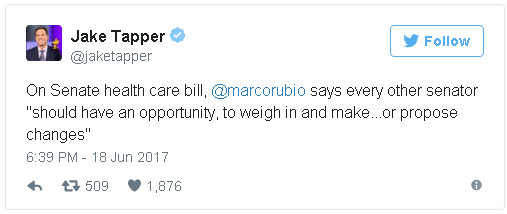Still Doing Nothing About It, It would take just three to make their leadership listen
A bunch of Republican senators are frustrated with leadership plans to pass a sweeping health care bill with almost no public deliberation.
In fact, they are so frustrated that they seem to have forgotten it would take just three of them to force a slower, more open process.
The latest GOP senator to express concern is Marco Rubio, of Florida. Toward the end of his appearance Sunday on CNN’s “State of the Union,” his discussion with host Jake Tapper turned to health care legislation ― specifically, the bill to repeal the Affordable Care Act.
 When the House passed the American Health Care Act (AHCA), its version of the legislation, Republican senators were quick to decry both the bill and the debate that led to it. They said the House had acted brashly ― hatching legislation behind closed doors and then rushing to vote before the public could get a good look at it. Republican senators also said the proposal itself was too harsh ― breaking promises to protect people with pre-existing conditions and taking insurance away from 23 million people, according to Congressional Budget Office predictions.
When the House passed the American Health Care Act (AHCA), its version of the legislation, Republican senators were quick to decry both the bill and the debate that led to it. They said the House had acted brashly ― hatching legislation behind closed doors and then rushing to vote before the public could get a good look at it. Republican senators also said the proposal itself was too harsh ― breaking promises to protect people with pre-existing conditions and taking insurance away from 23 million people, according to Congressional Budget Office predictions.
Now it’s clear that the Senate process won’t play out so differently after all.
A group of GOP senators has been writing the bill in private. Senate Majority Leader Mitch McConnell (R-Ky.) plans to take legislation directly to the Senate floor, where it will most likely get just 20 hours of formal discussion. Neither the Finance Committee nor the Health, Education, Labor, and Pensions Committee ― the two with jurisdiction ― plan to hold hearings. (In 2009 and 2010, Democrats held literally hundreds of hours of hearings, as part of a process for the Affordable Care Act that took more than a year to complete.)
The Senate legislation itself is likely to look resemble that House bill so many GOP senators insisted they couldn’t tolerate. It might propose to unwind the Affordable Care Act’s expansion of Medicaid a little more slowly and offer marginally more financial assistance to lower-income and older consumers, but overall, the impact of the bill would be nearly the same. Many millions of people would lose health insurance, and millions more would lose consumer protections that guarantee access for people with serious medical problems.



















